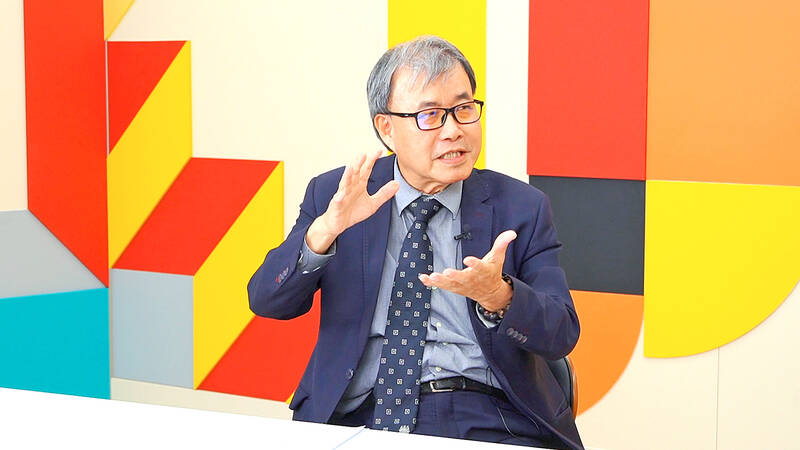Minister of Education Cheng Ying-yao (鄭英耀) is to hit the brakes on the Bilingual 2030 policy, but would keep it on the nation’s agenda, he said during an interview published yesterday.
“These things take time,” he said. “We need to slow down.”
Taiwanese enterprises are active globally and need people with professional-level proficiency in the English language, Cheng told the Liberty Times (sister paper of the Taipei Times) in an exclusive interview.

Photo: Huang Chun-hsuan, Taipei Times
English-only universities are attractive to high-performing foreign students who can become part of the nation’s skilled workforce, he said.
Cheng said that while president of National Sun Yat-sen University, he contributed to the design and implementation of a 10-year plan to achieve English-only instruction at its graduate school.
The program emphasized recruiting qualified faculty members and course design before launching classes in English, which would only be mandatory at the university’s graduate school in 2030, he said.
The undergraduate section would offer optional courses taught in English, Cheng said.
About 80 percent of Taiwanese enterprises have branches in 20 to 30 foreign nations, most of which use English, he said, adding that bilingual education needs to start now to prepare the workforce two or three decades from today.
The implementation of the Bilingual 2030 policy leaves something to be desired, as local governments are in a rush to hire English teachers regardless of qualifications to meet targets, he said.
Under Cheng’s leadership, the Ministry of Education would show more care in its coordination with local education authorities to ensure the core competencies of educators are not neglected, he said.
Children should be encouraged to learn English in their daily lives, Cheng said, adding that he launched as the then-director-general of the Kaohsiung Education Bureau collaborations with McDonald’s and doctors to promote the use of English by students.
Children making orders in English were rewarded with a free side of fries and those using the language to speak with doctors got a NT$50 discount on their appointment fees, he said.
The ministry is to make a greater effort to give students from poor rural regions or culturally disadvantaged backgrounds the English-language education they need, he added.
Citing a study by students’ rights group EdYouth, Cheng said metropolitan areas have a near glut of bilingual education resources.
The ministry is mulling plans to use university social responsibility programs to send more university students to teach English to children disadvantaged by geography or culture, he said.
Meanwhile, the vocational school system must become skill-centric instead of focusing on conferring diplomas, and the culture of rewarding employees for educational attainment instead of practical skills must be changed, he said.
Vocational high-school graduates on average make NT$25,000 to NT$28,000 a month, much less than university graduates who make NT$32,000 to NT$35,000 a month, he said.
The disparity in income spurs 90 percent of vocational school graduates to try enrolling in a university instead of learning a trade, with negative implications for the economy, he said.
Regarding the aging population, Chen said that employee education could be an answer to the economy’s need for a trained workforce.
There are 8 million working Taiwanese between the ages of 30 and 50 who should be able to study at universities, he added.

The High Prosecutors’ Office yesterday withdrew an appeal against the acquittal of a former bank manager 22 years after his death, marking Taiwan’s first instance of prosecutors rendering posthumous justice to a wrongfully convicted defendant. Chu Ching-en (諸慶恩) — formerly a manager at the Taipei branch of BNP Paribas — was in 1999 accused by Weng Mao-chung (翁茂鍾), then-president of Chia Her Industrial Co, of forging a request for a fixed deposit of US$10 million by I-Hwa Industrial Co, a subsidiary of Chia Her, which was used as collateral. Chu was ruled not guilty in the first trial, but was found guilty

DEADLOCK: As the commission is unable to forum a quorum to review license renewal applications, the channel operators are not at fault and can air past their license date The National Communications Commission (NCC) yesterday said that the Public Television Service (PTS) and 36 other television and radio broadcasters could continue airing, despite the commission’s inability to meet a quorum to review their license renewal applications. The licenses of PTS and the other channels are set to expire between this month and June. The National Communications Commission Organization Act (國家通訊傳播委員會組織法) stipulates that the commission must meet the mandated quorum of four to hold a valid meeting. The seven-member commission currently has only three commissioners. “We have informed the channel operators of the progress we have made in reviewing their license renewal applications, and

Taiwan People’s Party (TPP) Chairman Huang Kuo-chang (黃國昌) yesterday appealed to the authorities to release former Taipei mayor Ko Wen-je (柯文哲) from pretrial detention amid conflicting reports about his health. The TPP at a news conference on Thursday said that Ko should be released to a hospital for treatment, adding that he has blood in his urine and had spells of pain and nausea followed by vomiting over the past three months. Hsieh Yen-yau (謝炎堯), a retired professor of internal medicine and Ko’s former teacher, said that Ko’s symptoms aligned with gallstones, kidney inflammation and potentially dangerous heart conditions. Ko, charged with

Taiwan-based publisher Li Yanhe (李延賀) has been sentenced to three years in prison, fined 50,000 yuan (US$6,890) in personal assets and deprived political rights for one year for “inciting secession” in China, China's Taiwan Affairs Office spokesman Chen Binhua (陳斌華) said today. The Shanghai First Intermediate People’s Court announced the verdict on Feb. 17, Chen said. The trial was conducted lawfully, and in an open and fair manner, he said, adding that the verdict has since come into legal effect. The defendant reportedly admitted guilt and would appeal within the statutory appeal period, he said, adding that the defendant and his family have